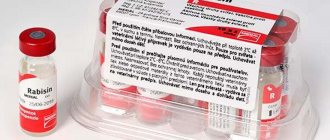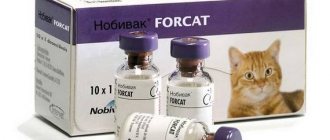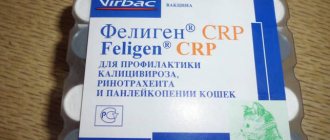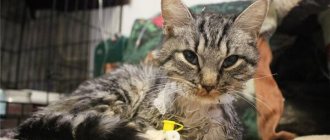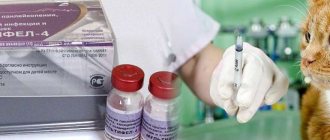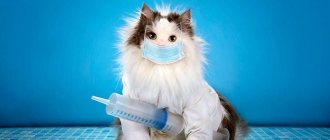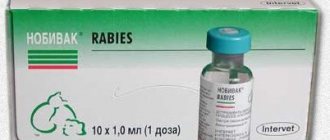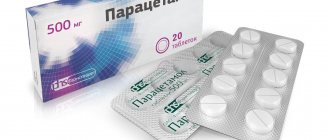Purevax for cats is a drug produced by a French company. This is a fairly high-quality vaccine that has received quite a lot of positive feedback from experts and cat owners.
The drug is live and modified, does not have a therapeutic effect, and can stimulate the body’s immune response against the causative agents of many diseases that a cat can suffer from: calcivirosis, panleukopenia, rhinotracheitis.
Composition and release form
The vaccine in its commercial form is called Purevax RCP. The vaccine is packaged in glass vials of 1 ml (1 dose). The bubbles are sealed with rubber stoppers and covered with metal caps on top. Each bottle has a label indicating the name and purpose of Purevax, its volume in the bottle, manufacturer and expiration date.
The vaccine in vials is packaged in boxes of 10 doses.
The Purevax vaccine is valid for 18 months from the date of production. It must be stored and transported at a temperature of 2 - 8 degrees. Freezing Purevax is prohibited. It must be remembered that a spoiled vaccine can cause illness and even death of a cat.
Purevax contains two components:
- Dry powder, beige in color, which includes weakened antibodies of certain diseases.
- A sterile solution is a clear liquid used to prepare a suspension for injection.
The vaccine is mixed with a diluent at the time of use. Biological effects The Purevax vaccine causes the formation of an immune reaction in cats to the pathogens of panleukopenia, rhinotracheitis, calicivirus and chlamindia 14 - 28 days after administration. The duration of the effect of Purevax is a year.
Contraindications
Interaction with other drugs
The Purevax vaccine is used only separately. The simultaneous use of the vaccine and other immunobiological compounds is prohibited. An exception is the Rabisin rabies vaccine. The simultaneous use of Purevax and Rabizin is acceptable if they are administered separately. Other medications may be used 165 days before and after Purevax is administered.
The effectiveness of vaccination may be significantly reduced due to the use of immunoglobulins, sulfonamides and anti-inflammatory drugs a few days before the Purevax vaccine is vaccinated.
The vaccine is not applicable:
- When a cat is pregnant and in lactation period;
- If the cat is very exhausted;
- When a disease is suspected or when the cat is sick;
- In the case where the animal has not undergone deworming;
- When a cat experiences hypersensitivity to the components of Purevax.
After vaccination, negative reactions in animals are rarely recorded. This is due to the lack of auxiliary elements and low protein load. However, it is not possible to completely exclude local manifestations. Mostly side effects are short-term in nature.
The vaccine may cause the following side effects:
- The cat may refuse to eat. The pet may exhibit drowsiness and general weakness;
- Rarely, there is an increase in temperature, which returns to normal within a maximum of two days;
- Seals are noticeable at the injection site;
- Local swelling and itching are possible.
Limitations and side effects
Only clinically healthy pets can be vaccinated. The animal should not show signs of an infectious disease. Otherwise, the use of the drug is possible only after complete recovery. The vaccine cannot be used for the following categories of animals:
- weakened;
- exhausted;
- pregnant women;
- nursing;
- for kittens up to 8 weeks.
The presence of internal or external parasites is also a contraindication for immunization, as they help reduce the body's defenses. As a result, the animal may not be able to cope with the “load” when cells infected with viruses are introduced.
If Purevax is used for healthy cats and according to the instructions, symptoms of infectious diseases do not appear. The following side effects sometimes occur at the injection site:
- pain when pressed;
- swelling that can be easily felt with your hands;
- temperature increase.
The local reaction usually goes away on its own within 1-2 weeks. Sometimes the animal refuses food and water, becomes lethargic and drowsy. An increase in body temperature may occur. All symptoms go away on their own within a few days.
Purevax may cause an allergic reaction. When administering the product, first aid medications should be on hand to provide first aid to the animal.
Dosage
Vaccination is allowed if the cat is completely healthy. Each animal is injected with a sterile needle. Just before use, the vaccine in the vial is diluted with 1 ml of solvent using a sterile syringe. Then shake well until the Purevax vaccine acquires a homogeneous consistency. The vaccine is administered subcutaneously, in the area of the shoulder blade, one dose (1 ml), regardless of what breed the cat is or how much it weighs.
A cat can be vaccinated at 8 weeks of age. The primary vaccination is carried out twice, repeated after 3 weeks.
If a veterinary examination of a cat reveals elevated titers of specific maternal antibodies, the primary vaccination is delayed until the cat reaches 12 weeks.
The cat should be vaccinated every year, with the above dosage. For allergies, when a cat shows hypersensitivity to one of the components of Puravax, symptomatic treatment is prescribed. If several susceptible cats live in a room (when the cat has reached the age allowed for vaccination), it is recommended to vaccinate all animals at the same time with Purevax.
Instructions for use of Purevax for cats
Administration by intramuscular or intranasal route is not permitted. Purevax is administered only subcutaneously. The vaccine, diluted with a solvent, is stored for no more than 2 hours before use.
The Purevax vaccine is used strictly according to the instructions:
- Do not allow the mixture to come into contact with the skin. After vaccination, you need to treat your hands with disinfectants.
- The cat receives its first vaccination at the age of 2 months - with Purevax without additional rabies medication.
- The cat receives a second vaccination at 3 months. Two injections are made - the Purevax vaccine, intended to prevent four diseases, with the addition of Rabisin against rabies. The agents cannot be mixed; they must be administered separately.
- If the cat missed the vaccination date, you should hurry and do the procedure as soon as possible.
If you adhere to the basic requirements specified in the instructions, the vaccination procedure takes place without harm or complications for your pet. The list of vaccinations performed is recorded in a special veterinary document. It is required for participation in exhibitions, when traveling abroad, and, very importantly, for proper vaccination in the future.
How to use
The instructions for use contain detailed instructions on how to use Purevax for cats. A few simple rules must be followed:
- Liquid and dry components must be mixed immediately before administration. The prepared solution cannot be stored.
- During the procedure, you must adhere to the rules of asepsis and antisepsis.
- 10 days before vaccination, you need to deworm your pet using suitable anthelmintics. This rule should not be neglected, since parasites significantly reduce the animal’s immunity, which can cause complications after vaccination.
- Injections are given subcutaneously.
- If several animals are being vaccinated at the same time, a new sterile syringe should be used for each pet.
Advantages and disadvantages
Purevax is a live vaccine, that is, it contains a weakened live virus obtained from apathogenic pathogens.
Purevax is more advanced than other live vaccines; many experts choose this drug based on the fact that:
- The infection artificially caused by the administration of this drug continues for the calculated time without provoking the clinical picture of the disease;
- A cat vaccinated with this drug remains healthy and does not show any pathological changes. Almost all animals that have undergone this procedure tolerate vaccination well;
- Purevax actively and for quite a long time stimulates the formation of immunity to painful strains of microorganisms;
- The Purevax vaccine creates stronger immunity than others;
- The inactivated vaccine has been successfully used to vaccinate animals from eight weeks of age.
There are certain disadvantages inherent in live vaccines, including Purevax.
After vaccination, the following negative manifestations are possible in an animal:
- Unexpected mutations. During the period of virus reproduction in the body of a furry animal, transformations of the genetic structure are possible, as a result of which the virulence of this microorganism can return and the cat will become truly ill.
- Mixed infection with a “wild” virus. This is too dangerous, but such variations are very rare.
- The cat must be absolutely healthy at the time of vaccination. If your pet's immune system is weakened, the vaccine may trigger the development of the disease.
Expert opinion
The Purevax vaccine is a reliable and effective drug for vaccinating cats of all ages, starting from the earliest period of life. This fact makes Purevax a leader among other live vaccines. After all, the kitten’s immune system is not yet stabilized and there is a risk of infection, which can have serious consequences for the animal. Vaccination carried out annually with this drug, subject to compliance with all the norms and rules specified in the instructions, already on the 14th day forms immunity to dangerous diseases. The Purevax vaccine guarantees your cat’s health throughout the year without any risks.
Biological properties
After vaccination with Purevax, after 2-4 weeks, cats develop immunity against a number of diseases caused by dangerous viruses. The resulting protection is valid for 12 months. To reliably protect an animal from panleukopenia, rhinotracheitis, rabies and other diseases, vaccination must be repeated annually.
The use of Purevax, like other vaccines, does not provide 100% protection against viruses, but the risk of developing the disease is significantly reduced. In addition, in case of infection, a vaccinated animal tolerates pathology more easily and recovers faster, but subject to timely and comprehensive treatment.
Since the product contains non-living cells infected with viruses, it is considered harmless to animals. If you follow the recommendations and simple rules of use, it does not cause complications.
Note! Purevax does not have medicinal properties. It is used exclusively for prophylaxis - preventing infectious pathologies in cats.
Feedback from cat owners
Catherine
On the advice of the veterinarian at the clinic where I go with my cat, they vaccinated me with Purevax. He warned about possible manifestations and recommended avoiding walks and cold air after vaccination. Before vaccination, he examined the general health of the animal, and we carried out deworming before vaccination, as it should. I didn’t notice any particular negative phenomena. Only on the first day my Mona was sleepy, her appetite was not as usual. The temperature did not increase. There were small bumps at the injection site, which resolved after a day. Since my cat is healthy and well-groomed, the Purevax vaccination only benefited her. Now I have peace of mind for her throughout the year.
Anna
A friend of mine vaccinated her cat with the Purevax vaccine. She was very pleased as the procedure went well and she took her cat out for walks without fear. We have two small children and a cat at home. They play together, the cat leaves the house and walks on its own, and we don’t know who she meets in the yard. They were afraid that she herself would become infected and were also worried about the children. I decided to get vaccinated. The specialist conducted all the necessary research and set a vaccination day. After the injection of the Purevax vaccine, the cat was in good condition. She purred when the injection site was touched, but this went away after two days. The Purevax vaccine is an excellent remedy, thanks to which immunity lasts for a whole year, now we are calm for both our pet and our children.
Vaccination against feline leukemia virus
Cats that are already carriers of the FeLV virus cannot be vaccinated. Therefore, before vaccination it is necessary
conducting serological testing for the presence of antibodies to the leukemia virus. It is possible to guarantee that a cat is not a carrier only in relatively rare cases - for example, kittens from parents with negative test results who have not had contact with other animals will also have a negative FeLV status. In our clinic in Moscow, testing is carried out using rapid tests, so it can be carried out immediately on the day of the intended vaccination, it does not take much time.

